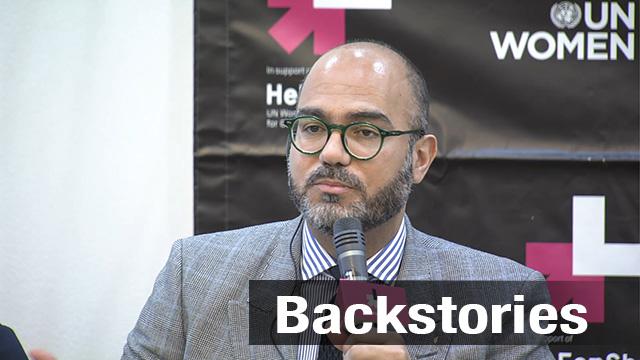Naciri came to Tokyo in March as a delegate of the World Assembly for Women. At its side event, he told participants to doubt the traditional mindset.
"We don’t want any more to read the stories of children, like Cinderella, like Snow White -- only stories where women are sitting as victims waiting for Prince Charming to come and sweep them off their feet. Why don’t we have that the other way around?"
Before he took on his new role in Asia, he was the same position in the Arab States. He says that he focused on removing discriminatory laws. For example, he supported efforts to scrap a law in Lebanon under which a rapist could be exempt from punishment if he married his victim. The nation’s parliament abolished it in 2017.
He says there have been many positive developments in the region in the past few years. However, he stresses that one of the obstacles to promoting gender equality in the region is war, especially in Syria, Iraq and Yemen.
"The Middle East is one of the areas in the world that has the highest number of conflicts. We have been trying to work with them and for them to provide opportunities for economic activities to see how we can deal with the violence, and to see how we also have more women on the negotiating table for peace."
In his new role, Naciri says he wants to tackle two issues.
"I will be working very strongly with everyone on the economic empowerment of women and ending violence against women. We still have high rates of violence against women in many parts of the region, like India for example. But many of those who are still under the poverty line are women and girls."
"And we do consider if we work on economic empowerment for women, we can also work on many other challenges because a woman who is independent and strong financially and economically can have a higher chance to say no to violence. And she can participate better in the political life, she can demand a place on the negotiating table for peace in countries where conflict is, like Afghanistan."
Japan holds the international conference of the World Assembly for Women every year, but it’s notorious for its small number of female politicians and business executives. Still, Naciri regards Japan's situation positively because the gender issue is already being discussed there. He expressed his appreciation for the nation’s provision of funds to the Arab nations.
"Japan has been the strongest supporter for the Middle East and North Africa. The Syrian women and girls, Yemeni girls and women have been supported by Japanese taxpayers, Japanese government. And every woman and girl that had a better chance over the past six years in that region, in these conflict areas, it is because of Japan."
Naciri emphasizes the importance of engaging men and boys in the gender equality issue. He believes that promoting it brings huge benefits for men as well. He cites research that says that over 50 percent of men in the Middle East and North Africa have shown some sort of depressive symptoms because of the pressure to provide for and protect the women in their households.
"We all dream of a better tomorrow for all of us. And the responsibility in a traditional patriarchal society on men is immense. If they feel that they are free to share the responsibility with women, then their burden is going to be less. So this is one of the quick one that we can think as men when women have and share the space with us."
Naciri says that he wants to put more efforts into persuading men and boys to engage in gender equality in Asian nations as he did in the Arab States.

